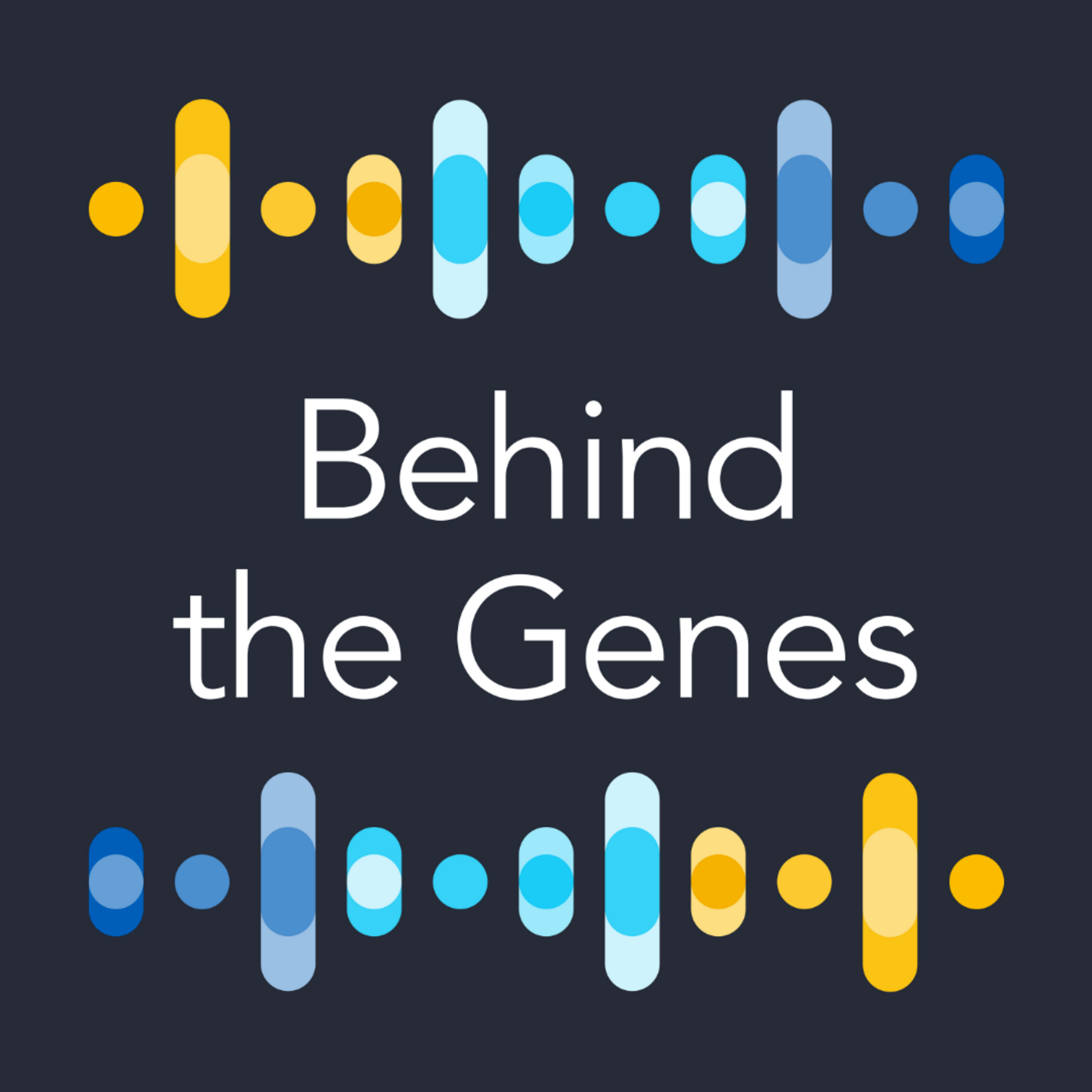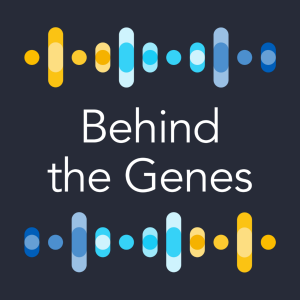
We are Genomics England and our vision is to create a world where everyone benefits from genomic healthcare. Introducing our refreshed podcast identity: Behind the Genes, previously known as The G Word. Join us every fortnight, where we cover everything from the latest in cutting-edge research to real-life stories from those affected by rare conditions and cancer. With thoughtful conversations, we take you behind the science. You can also tune in to our Genomics 101 explainer series which breaks down complex terms in under 10 minutes.
We are Genomics England and our vision is to create a world where everyone benefits from genomic healthcare. Introducing our refreshed podcast identity: Behind the Genes, previously known as The G Word. Join us every fortnight, where we cover everything from the latest in cutting-edge research to real-life stories from those affected by rare conditions and cancer. With thoughtful conversations, we take you behind the science. You can also tune in to our Genomics 101 explainer series which breaks down complex terms in under 10 minutes.
Episodes

Wednesday Dec 08, 2021
Dr Harpreet Sood: Understanding communities
Wednesday Dec 08, 2021
Wednesday Dec 08, 2021
“If you really embed yourself in the community, embed yourself within the people that are going to be using a solution and try to understand from them what their pain points are, you build trust from the outset. You’re saying, ‘we're doing this for you and we're working together to do it’.”
In this week's episode of The G Word, Rakhi Rajani, our Chief Digital Officer, is joined by Dr Harpreet Sood, a primary care doctor and digital health expert. Formerly Associate Chief Clinical Information Officer (CCIO) and Senior Fellow to the CEO of NHS England, he is a board member at Health Education England (HEE), a trustee at the South Asian Health Foundation and Co-Founder of the NHS Digital Academy.
Harpreet discusses developing NHS England’s digital health and data strategy, his role at Health Education England and new models of primary care. He also talks about debunking Covid-19 vaccine myths and The South Asian Health Foundation.

Wednesday Dec 01, 2021
Dr Maria Chatzou Dunford: Connecting data
Wednesday Dec 01, 2021
Wednesday Dec 01, 2021
“Our big mission and vision is to make sure that any data that can be used to cure these diseases is actually used. And we do that by connecting as much data as possible - as many types from as many different sources as we can find.”
In this week's episode of The G Word, Chris is joined by Dr Maria Chatzou Dunford, CEO and Co-Founder of Lifebit and expert in bioinformatics, medical informatics and high-performance computing. With a PhD in Biomedicine, she is also part of the developing team at Nextflow, a bioinformatics engineer at SciLifeLab and a passionate entrepreneur.
Maria discusses her work with Lifebit, founding multiple companies and advances in AI. She also talks about the rate at which genomic data is being generated and making data useable.

Friday Nov 26, 2021
Dr Anna Lewis: How do we go about defining and conceptualising ancestry?
Friday Nov 26, 2021
Friday Nov 26, 2021
“We need some more conceptual clarity around ancestry so that we can build up some recommendations on how it should be used in genomic research.
There have been a lot of previous recommendations, around the use of race, ethnicity and ancestry in genetic research, but most don’t say much about ancestry. I think that it's fitting to get more of a conversation around it. I am really excited about the work Genomics England are doing to put an extra layer of logic around diversity.”
In our final episode of our Diverse Data Week on The G Word, Dr Anna Lewis, a scholar of Ethical, Legal and Social implications (ELSI) of Genomics, talks with Dr Maxine Mackintosh, our Diversity Programme Lead, about how we should go about defining, classifying and conceptualising ancestry. Together they discuss a range of common issues and potential solutions.

Thursday Nov 25, 2021
Dr Garrett Hellenthal: What can we learn about human history using DNA?
Thursday Nov 25, 2021
Thursday Nov 25, 2021
“It’s incredibly important that we build up reference data sets in other worldwide populations so that we can learn more about the ancestry of people.”
On today’s episode of The G Word, James Cook, one of our Bioinformaticians in Research Services at Genomics England, is joined by Dr Garrett Hellenthal, a Sir Henry Dale Fellow working on constructing and applying statistical methods to infer human history using genetic data at UCL Genetics Institute (UGI).
Today, Garrett and James talks about population genetics and diverse data. They discuss a recent study in which Garrett analysed data from Ethiopian populations to study the sociological features that lead to genetic differentiation among ethnicities and the People of the British Isles (PoBI), a project to create the first detailed genetic map of a country.

Wednesday Nov 24, 2021
Sophia Luu and family: Creating awareness with East Asians about genomics
Wednesday Nov 24, 2021
Wednesday Nov 24, 2021
“[Sophia at Genomics England] is trying to design new ways to get people of different backgrounds to understand what the database is, donate, and ensure that the data gets used.”
Joining us on today’s episode of The G Word is Sophia Luu’s family, interviewed by Sophia Luu herself, our Design Researcher on the Diverse Data Programme. She is joined by her grandfather, her grandmother, her father and her mother to discuss why not many people of East Asian descent are in our database.
During their discussion they touch on our Diverse Data Programme and the different groups of people missing in our dataset. They also discuss past experiences with doctors, abortion and the religious and cultural aspects of healthcare.

Monday Nov 22, 2021
Primrose Granville: The journey to better healthcare for everyone
Monday Nov 22, 2021
Monday Nov 22, 2021
“The journey of a thousand miles begins with one step. I believe we have made that step and that they are now becoming large strides.”
In this first episode, Dr Maxine Mackintosh, our Diverse Data Programme lead, speaks to Primrose Granville, an award-winning broadcaster, kidney recipient and community health campaigner leading a Black Heath Matters Programme on behalf of Genomics England in Bristol.
Primrose was born, raised and educated in Jamaica, migrating to the UK when she was 27 years old. Today, 25 years on, she is a journalist, presenter and producer on BCFM and a well-known figure at the heart of the African and Caribbean community in Bristol.
She was born with Polycystic Kidney Disease, as was her mother, grandmother, sister, son and probably several others in her family. She shares her personal journey, from having a kidney transplant to making it her life’s work to campaign for better healthcare for everyone. She also tells us why we need to change the narrative if we are to succeed in our ambitions to encourage people from all ethnicities to participate in medical research.

Wednesday Nov 17, 2021
Jo Taylor: Bringing the patient voice to metastatic cancer issues
Wednesday Nov 17, 2021
Wednesday Nov 17, 2021
“We need to have these open and honest conversations with patients, because otherwise where is the duty of care? We're failing patients if we’re not being honest with them and saying, ‘there’s no evidence of disease at the moment, we believe that we've done everything that we can to make sure that the cancer doesn't come back, but unfortunately around 30% of people will develop secondary breast cancer and we don't know who they will be.’”
In this week’s episode of The G Word #sciencepodcast, our CEO Chris Wigley is joined by Jo Taylor, Chief Executive Officer and Founder of After Breast Cancer Diagnosis (ABCD), Founder of METUPUK and user involvement representative for Macmillan and GM Cancer.
Today Jo talks about her own inspirational cancer story, bringing the patient voice to metastatic cancer issues and personalised care. She also discusses her free book ‘Real stories by patients for patients’ and the Darker Pink campaign.

Friday Nov 12, 2021
Nicola Blackwood: Genomic technologies and a diagnostic odyssey
Friday Nov 12, 2021
Friday Nov 12, 2021
“To be doing something with rare diseases is, for me, an absolute pleasure and a joy because there are too many people in this country who are still looking for a diagnosis and we’re doing something to help.”
In this week’s episode of The G Word, our Chief Executive Officer, Chris Wigley, is joined by Baroness Blackwood, member of the Lords Science and Tech Select Committee and Chair of Genomics England. Nicola was created a life peer as Baroness Blackwood of North Oxford and has chaired the Human Tissue Authority since 2018.
Today Nicola talks about her own 30-year diagnostic odyssey and how life changing the integration of genomic technologies into routine clinical care will be. She also discusses how important is it that we continue international collaboration for the future of genomic healthcare and what we need to work through as a society.

Wednesday Nov 03, 2021
Deb Lancaster: Wrangling the research community
Wednesday Nov 03, 2021
Wednesday Nov 03, 2021
“Speaking as someone who's spent most of my career in Pharma, I know how important data is to bringing medicines to market, and to understand; where does the patient need a new treatment? How can that be targeted? How can discovery be pulled together so that you can actually give that patient a drug that's effective and safe?”
In this week’s episode of The G Word science podcast, our Head of Public Engagement, Vivienne Parry, is joined by Deb Lancaster, Service Owner in our Digital team at Genomics England, who makes sure that our researchers within the academic community and biotech industry, are able to interact with our data in an easy, simple and effective way.
Today Deb talks about the unique way that Genomics England is working with the NHS to build the Genomic Medicine Service, and our secure and safe Research Environment where researchers can work together for the benefit of participants and for patients in the future. Deb is also passionate about getting women and girls into STEM.

Wednesday Oct 27, 2021
Dr Nick Sireau: The impact of patient groups
Wednesday Oct 27, 2021
Wednesday Oct 27, 2021
“What Findacure does is try to promote this concept of drug repurposing, and all the issues around there. That is another area of hope for rare diseases.”
In this week’s episode of The G Word #sciencepodcast, our Chief Executive Officer, Chris Wigley, is joined by Dr Nick Sireau, the CEO and Chairman of the AKU Society and Co-founder and Chairman of Findacure. Additionally, Nick is a fellow of the Ashoka global fellowship of social entrepreneurs.
Today Nick talks about alkaptonuria (AKU also known as “black bone disease”), an ultra-rare genetic disease that his two children have and the DevelopAKUre project that was established to improve the understanding of alkaptonuria. Chis and Nick discuss Findacure which Nick co-founded to share advice and knowledge between patient groups, they also talk about how patient groups help drug discovery.
